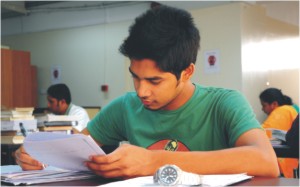Language
For the Students
Anis Fatema
 |
Photo: Yamin Tauseef Jahangir |
In today's civilised world, English, being the international language, holds the most important position. Nowadays without knowing proper English it is hard for the ones who have intentions of getting higher education or going abroad. Students have no other choice except learning English properly.
There are four basic skills of English language of which the students should have a clear idea about. They are: reading, listening, speaking and writing. The learning process of English language consists of the first two skills: reading and listening. Further comes the skill of speaking, which widely proves the capability of a person who claims himself to be a good speaker in English. This speaking skill is followed by writing skill as well. One who can speak nicely or deliver a lecture properly on a particular topic arranging correct information can be accepted also to write well. Through the process of written examination the capability of a student is measured by his writing skill.
The habit of reading English newspapers regularly and using dictionaries are the two most praise worthy qualities of a good student. Newspaper is a complete world full of knowledge and information. Everyday a newspaper reveals itself with a new look containing different headlines and articles. Reading English newspapers help a student in two ways. Since, using excellent and appropriate words composes different informative articles, firstly, a student will be able to learn more words by reading them. Secondly, a student can keep himself connected with the current world by reading newspapers and fill his mind with wisdom. Students who are taking part in various kind of debate and quiz competitions and those who are delivering speeches in different occasions are considered as not only good but also highly capable students. Newspapers are an unavoidable part of the daily routine of such a capable student. Therefore, English newspapers guide a student by filling his mind with wisdom and knowledge to move ahead with perfect fluency in English.
To use dictionary cannot be mentioned as a habit, it is a necessity. Wherever a student finds difficulties with some unknown words they go through the dictionary. Students who have correct information, knowledge and idea on a particular topic can choose the dictionary as an assisting material to improve his writing skill. The student must take help from the dictionary but he cannot depend on it. A dictionary cannot be used in the same way a calculator is being used in Mathematics. In the Examination hall using a calculator is permitted but using a dictionary is prohibited. Especially, in the case of speaking, the speaker cannot look at the dictionary again and again and deliver his lecture. So, the right way of using a dictionary is to learn words from it and to recall them when it is needed. The students are advised to take in anything and everything they can from the vast sea of words of the dictionary but not to hide themselves behind the tiny black letters of it. A dictionary should be used as a weapon to provide a particular composition with an ornamental look but it must not be used as a measuring scale to measure the proficiency of English.
The complete daily routine of a student cannot be drawn so easily but at least it can be said that an ideal student's day begins with the headlines of the daily newspapers and ends at some newly learnt words of a dictionary while doing his home task.
(The writer is Junior Teacher (English) at BAF Shaheen English Medium School.)
| 